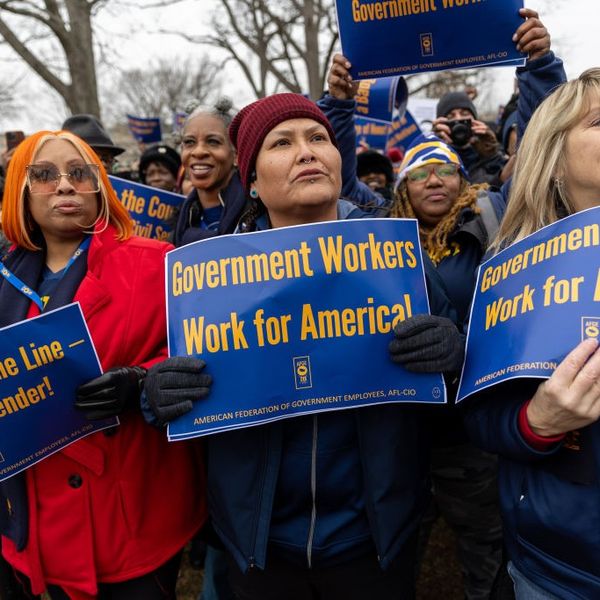Just days after Kentucky became the 27th state in the nation with such an anti-worker law, Republicans controlling legislatures in New Hampshire and Missouri are working fast to pass their own so-called right-to-work laws.
As economist Dean Baker has summed them up, right-to-work laws guarantee "the ability for a worker to benefit from union representation without having to pay for union representation." The Economic Policy Institute has stated that the "[m]isleadingly named" laws "aim to undermine unions' bargaining strength" and, contrary to their proponents' claims, "do not have any positive impact on job growth."
In Missouri, a "sometimes tense House hearing" took place Tuesday, as the Associated Press reported, where lawmakers have several right to work proposals.
Proponents and foes of the laws packed the room, and according to public radio KRCU, "A largely union-friendly crowd occasionally laughed and scoffed whenever a right-to-work supporter testified that the legislation would increase jobs and improve Missouri's economy. "
A Senate hearing is scheduled for Wednesday, and the governorship now being held by a Republican means "the likely end of meaningful opposition to the bill," the Columbia Missourian reports. Local Fox affiliate KTVI added: "Making Missouri a right-to-work state is a big priority for Governor Eric Greitens."
The New Hampshire state house on Tuesday also saw a public hearing that drew hundreds concerned over a proposed right-to-work law, which matches verbatim (pdf) a model bill from the American Legislative Exchange Council (ALEC), as the Center for Media and Democracy's ALECExposed project shows.
According to the Concord Monitor, "The proposal's lively first public hearing dragged on for four hours in a packed Representatives Hall. When it ended, the Senate Commerce Committee took less than hour to endorse the bill in a 3-2 vote along party lines."
The Union Leader reports that opponents of the measure "clearly outnumbered" its proponents, and "on several occasions challenged the ability of Sen. Dan Innis, chairing his first hearing as a newly elected senator, to maintain order in the chamber."
"There is no evidence this legislation would improve work opportunities, job security, or employment for hard-working Granite Staters," AP quotes Bob Jones, a public safety union president, as saying during the public hearing.
If it passes, New Hampshire would be the only state in the northeast with a right-to-work law.
The state-level moves, part of an ALEC and Koch brothers strategy, come less than two weeks before the inauguration of President-elect Donald Trump, who, organizer and writer Dave Kamper predicts, will usher in "an assault on worker rights the likes of which we have never seen."
*This post has been updated to reflect the ALEC connection.


